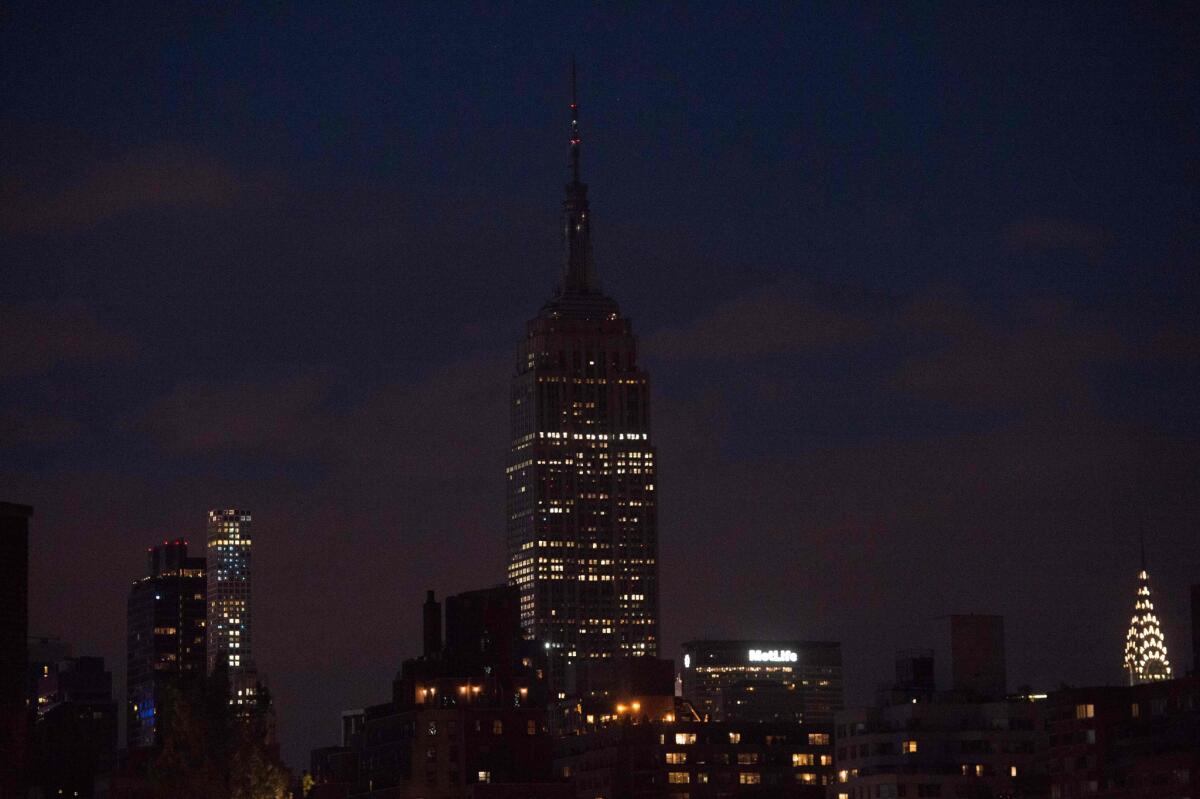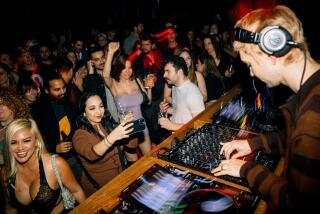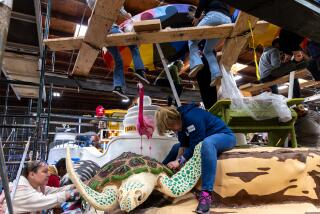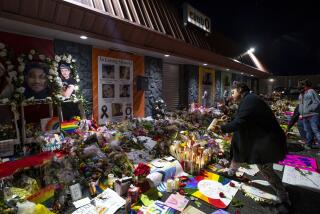In a month of pride, the gay community becomes a target of terror
The news of the Pulse nightclub shooting took Abel Alan Fingurs back to his childhood a generation ago, when the gay rights movement was in its infancy and he was often scared.
But on Sunday, the 52-year-old piano player came to West Hollywood anyway, determined to celebrate Pride Month and all it represents.
“I am not going to let fear run my life like it did when I was a child,” said Fingurs, choking up as he watched the parade pass by. “We are not afraid.”
The attack in Orlando, Fla., which left 50 people dead and 53 wounded, cast a shadow over a usually joyful weekend, when it’s often easy to forget that being gay in America can still be a risk. Across the country, the gay community struggled to reconcile the slaughter with the dramatic strides it has made toward equal rights over the last few years.
Sunday’s mass shooting, the deadliest in U.S. history, followed years of unprecedented progress for the country’s gay rights movement.
In the last five years, the U.S. has reversed policies that barred same-sex couples from receiving federal benefits and marrying, and prevented openly gay men and women from serving in the military. A majority of Americans now support same-sex marriage, as do a growing number of religious groups.
For more than a decade, Pulse has been popular with central Florida’s gay community. Patrons flock to the club to sing karaoke, watch drag queens and dance to salsa and bachata music on Latin nights.
Online tributes to Pulse poured in Sunday from across the country. Several men and women said it was the first gay club they visited, before they came out to their friends and families. The club’s name refers to a heartbeat, in honor of the owner’s brother, who died of AIDS in 1991.
“These places have significance to our community, which is what makes this all the worse,” said Carlos Guillermo Smith, a spokesman for Equality Florida. “We still aren’t where we need to be as a society.”
Lauren Brown, 26, of Silver Lake was raised in Orlando, and went to Pulse as she began to explore her sexuality. The club became an important fixture, she said, as the place she first kissed a girl, the place she felt safe in her hometown.
“I feel very lucky that now I live in Los Angeles, where it’s easy to be out,” she said. “This is a depressing reminder that there are people who hate us.”
In the last two years, lesbian, gay, bisexual and transgender advocates have fought a wave of legislation they say is toxic to LGBT Americans.
This year, North Carolina became the first state to ban people from using government-owned restrooms and locker rooms that don’t match the gender written on their birth certificates. A Mississippi law allows businesses and faith-based groups to deny housing, jobs and adoption services to people based on their sexual orientation.
As lines at blood donation centers grew longer Sunday, some people railed that gay men are still typically banned from donating blood, a legacy of the AIDS epidemic.
From AIDS to killings of transgender people, the LGBT community is too familiar with tragedy, said Lorri L. Jean, the chief executive of the Los Angeles LGBT Center. But Sunday’s attack still shocked, then saddened, her.
“Then I pretty quickly became mad that this is still happening in the United States,” Jean said. “They win if we allow these senseless and hateful acts to make us get back in the closet.”
The Pulse attack spurred an outpouring of support from across the social and political spectrum. Political figures including President Obama and Republican Sen. Marco Rubio of Florida condemned the attacks. The Empire State Building remained dark Sunday night in honor of the victims. Blood donation centers have been overwhelmed.

Within hours of the shooting, more than 100 “We Are Orlando” vigils had been organized across the country, from the courthouse steps in Butte, Mont., to gay bars in Greensboro, N.C., and Tulsa, Okla. Others occurred internationally, including in London and Vancouver.
In the Castro District of San Francisco, a quiet hush, punctuated by hugs and sniffles, enveloped more than a dozen passersby who gazed at a makeshift memorial of roses, sunflowers and lilies.
“It’s an attack on every one of us,” said Brian Levitt, 56, after he re-taped a sign on orange construction paper that said in Spanish, “For our fallen brothers and sisters in Orlando.”
Hundreds of people crowded the street outside the Stonewall Inn in New York, where the modern gay rights movement took root. At the bar’s entrance, near a heavy police presence, mourners arranged dozens of red roses and a sign that said “Stop the hate.”
Periodically, the crowd broke into chants of “No hate! No hate!”
“There’s always a sense of fear living your truth,” said Quincy Bell, 34, who attended the New York vigil and said he had been to Pulse many times. “The fear is always there.”
At 7 p.m. Monday in London, gay bars on Old Compton Street in Soho will stop serving drinks and turn off their music as staff and customers will head into the street to join hands in unity.
“People feel like they need to come together and be in one place because they’re shocked and people are scared,” said Jeremy Joseph, who owns the popular nightclub G-A-Y. “You have to not let it change our lives or the way we are living our lives, but we are living under a threat, constantly.”
On Sunday morning, police in Santa Monica arrested a man with a cache of weapons, ammunition and explosive-making materials in his car who had apparently planned to attend the Pride parade in West Hollywood. Law enforcement and city officials had decided against canceling the annual event.
“Our freedoms were gained because we stood tall and strong against violence and hatred from the very beginning,” West Hollywood City Councilman John Duran, who is gay, wrote in a Facebook post. “We have walked through hatred and darkness, plague and intolerance, lost thousands of our people along the way. We will not cower to terrorists.”
Mark Oshiro, 32, grew up in Riverside, where he said he stayed closeted because he had seen violence against people who were gay. As he stood and watched the L.A. Pride parade with his partner, he reflected that the shooting is “a painful reminder that we still have a lot of work to do.”
At one point, he looked behind his shoulder at a group of protesters gathered at the parade, holding signs that read, “Jesus saves from hell.” Those protests, Oshiro said, are “more callous given what happened last night.”
As crowds waving rainbow flags converged on Santa Monica and Crescent Heights boulevards, two women wearing rainbow bandannas and temporary tattoos on their cheeks raised their fists in the air.
Someone chanted: “When our community comes under attack, what do we do?”
The crowd responded, “Stand up! Fight back!”
Nelson reported from Los Angeles and Branson-Potts and Mejia from West Hollywood. Times staff writer Ron Lin in San Francisco and special correspondents Peter Moskowitz in New York and Christina Boyle in London contributed to this report.
ALSO
Victims of the Orlando nightclub massacre: Who they were
Orange County religious and community leaders decry Orlando violence, urge unity
A stranger was bleeding in the parking lot. This man saved his life with a shirt and a bear hug
More to Read
Start your day right
Sign up for Essential California for news, features and recommendations from the L.A. Times and beyond in your inbox six days a week.
You may occasionally receive promotional content from the Los Angeles Times.









